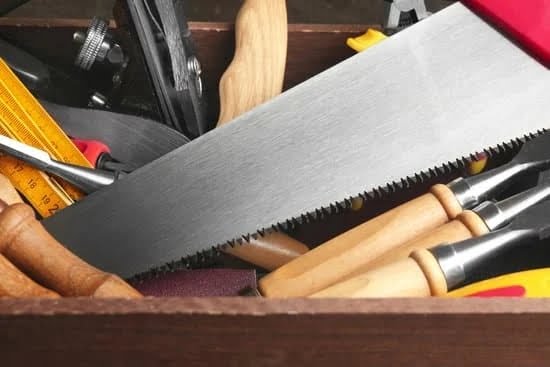Are you struggling to keep your small woodworking shop organized and clutter-free? In this article, we’ll explore a variety of small woodworking shop storage ideas to help you maximize space and keep your tools and materials neatly organized. From maximizing vertical space to creative storage solutions and must-have storage accessories, we’ve got you covered with practical tips and ideas for creating an efficient and tidy workshop.
When it comes to maintaining a small woodworking shop, every inch of space matters. Our focus will be on utilizing clever storage solutions that are specifically designed for small workshops. Whether you’re looking to make the most of vertical space, wall space, or compact areas, we’ll provide you with practical and innovative ideas to declutter your workspace and improve efficiency.
In addition to exploring ready-made storage solutions, we will also discuss the benefits of DIY projects and repurposing old furniture for storage purposes. With the right combination of organization systems in place, you can create a functional and visually appealing workspace that enhances your productivity as a woodworker. Join us as we delve into the world of small woodworking shop storage.
Maximizing Vertical Space
When working with a small woodworking shop, it’s crucial to make the most of every available space, including vertical space. Utilizing overhead shelving and hanging storage solutions can help keep your workspace organized and maximize efficiency. Here are some small woodworking shop storage ideas that make the most of vertical space:
- Overhead Shelving: Installing sturdy shelves near the ceiling can be an effective way to store items that are used less frequently. This could include boxes of wood scraps, rarely-used tools, or large pieces of equipment.
- Hanging Storage Solutions: Utilizing hanging systems such as hooks, baskets, or even pulley systems can create additional storage for items such as clamps, hand tools, or lumber. You can also install overhead rails to hang larger tools or materials.
By taking advantage of vertical space in your small woodworking shop, you can free up valuable floor and wall space for other essential work areas. It’s important to ensure that any shelving or hanging storage is installed securely to prevent accidents in the workshop.
Remember that when implementing these storage solutions, it’s essential to keep safety in mind. Ensure that heavy items are stored securely, and always follow proper installation guidelines for shelving and hanging systems in your woodworking shop. With some creativity and strategic planning, you can optimize your small woodworking shop with efficient vertical storage solutions.
Utilizing Wall Space
When it comes to maximizing space in a small woodworking shop, utilizing the wall space is essential. Pegboards are a versatile storage solution that allows for the organization of tools and supplies while keeping them easily accessible. By installing pegboards on the walls, woodworkers can hang and customize their storage systems according to their specific needs. This not only helps in keeping the workspace organized but also creates an efficient workflow.
Another great option for wall storage in a small woodworking shop is tool racks. These racks come in various designs and sizes, allowing woodworkers to find the best fit for their space. Tool racks can hold everything from hand tools to power tools, keeping them off the work surfaces and out of the way when not in use. This not only saves valuable floor and bench space but also adds to the overall organization of the shop.
In addition to pegboards and tool racks, magnetic strips are another fantastic way to utilize wall space for small woodworking shop storage. Magnetic strips provide a simple yet effective way to store metal tools such as chisels, wrenches, and screwdrivers.
By affixing these strips to the walls, woodworkers can keep their tools within reach without cluttering up tabletops or benches. With these creative wall storage solutions, even the smallest woodworking shops can become more organized and efficient spaces for creating masterpieces.
Compact Storage Solutions
Having a small woodworking shop doesn’t mean you have to compromise on storage space. In fact, there are plenty of compact storage solutions that can help you maximize the available space and keep your tools and materials organized. From roll-out tool cabinets to portable workbenches, these storage options are designed to fit seamlessly into a small workshop while still providing ample storage for your woodworking needs.
Roll-Out Tool Cabinets
One of the most efficient ways to store your tools in a small woodworking shop is with roll-out tool cabinets. These cabinets are designed to fit underneath workbenches or in tight spaces, and they feature multiple shelves and drawers for storing various tools and supplies. With their compact design and smooth rolling mechanism, roll-out tool cabinets make it easy to access your tools while keeping them neatly organized.
Portable Workbenches
When space is limited, having a portable workbench can be a game-changer for any woodworker. These compact workbenches can be easily moved around the workshop as needed, allowing you to utilize different areas for various projects. Many portable workbenches also come with built-in storage features such as drawers, shelves, and pegboards, providing additional storage options without taking up extra floor space.
Utilizing Compact Storage Solutions
In a small woodworking shop, every inch of space counts when it comes to storage. By incorporating roll-out tool cabinets and portable workbenches into your workshop layout, you can effectively utilize the available space while ensuring that all your tools and materials are easily accessible. These compact storage solutions not only help keep your workshop organized but also contribute to a more efficient and enjoyable woodworking experience.
Organizing Small Items
When it comes to organizing small woodworking shops, efficient storage solutions are crucial to maximizing the available space. Utilizing drawer dividers, stackable bins, and labeling systems can help keep small items easily accessible and neatly arranged.
Here are some small woodworking shop storage ideas to consider:
- Drawer Dividers: Investing in adjustable drawer dividers can help keep small hand tools, measuring instruments, and other accessories organized within tool chests or workbenches. Separating different types of tools or hardware within drawers can prevent clutter and make it easier to find what you need when working on projects.
- Stackable Bins: Utilizing stackable bins or clear plastic containers can help store small parts such as nails, screws, fasteners, and electrical connectors. These bins can be labeled for easy identification, and their stackable design saves valuable floor space in a compact woodworking shop.
- Labeling Systems: Implementing a labeling system for storage containers, shelves, and drawers can significantly improve organization in a small woodworking shop. Use adhesive labels or label makers to clearly mark the contents of each storage area. This not only makes it easier to locate items but also aids in maintaining an organized workspace.
By incorporating these small woodworking shop storage ideas into your workshop layout, you can create a more functional and efficient space for your woodworking projects. Whether you’re working with limited square footage or looking for ways to optimize your existing shop setup, these storage solutions can make a significant difference in keeping your workspace tidy and productive.
Creative Storage Ideas
When working in a small woodworking shop, it’s essential to maximize every inch of space available. One creative and cost-effective way to do this is by repurposing old furniture and undertaking do-it-yourself (DIY) storage projects. By thinking outside the box and using items in ways they weren’t originally intended, woodworkers can create unique and customized storage solutions that perfectly fit their needs.
Repurposing old furniture is a great way to add storage without taking up valuable floor space. For example, an old dresser can be stripped down and converted into a tool cabinet with ample drawer space for organizing small items like screws, nails, and other hardware.
Likewise, an unused bookshelf can be transformed into a vertical storage unit for lumber and long pieces of wood. By adding additional shelves or adjusting the existing ones, woodworkers can create custom-sized compartments for different types of wood.
In addition to repurposed furniture, DIY storage projects offer endless possibilities for creating tailored storage solutions. From building custom shelving units to constructing rolling carts with built-in tool holders, the options are only limited by one’s creativity and woodworking skills. DIY storage projects also allow woodworkers to customize their storage solutions based on the specific tools and materials they use frequently in their small woodworking shops.
| Repurposed Furniture | DIY Storage Projects |
|---|---|
| An old dresser converted into a tool cabinet | Building custom shelving units |
| An unused bookshelf transformed into a vertical storage unit for lumber | Constructing rolling carts with built-in tool holders |
| Custom-sized compartments for different types of wood | Tailored storage solutions based on specific tools and materials used frequently |
Must-Have Storage Accessories
In a small woodworking shop, it is crucial to make the most of the available space, ensuring that tools and materials are organized and easily accessible. Must-have storage accessories such as tool totes, tool belts, and mobile tool caddies play a significant role in keeping the workspace clutter-free and efficient.
Tool totes are essential for transporting various hand tools around the workshop or to different job sites. They come in different sizes and designs, allowing woodworkers to choose the best option based on their specific needs. Additionally, tool belts provide a hands-free way of carrying essential tools during woodworking projects. With multiple pockets and hooks, a tool belt ensures that everything a woodworker needs is within reach while working.
Another indispensable storage accessory for a small woodworking shop is the mobile tool caddy. This versatile piece of equipment allows woodworkers to store frequently used tools and supplies in one convenient place. Many mobile tool caddies feature wheels, making it easy to move them around the workshop as needed.
It’s important for small woodworking shop owners to invest in quality storage accessories like these since they can make a significant difference in efficiency and productivity. By keeping tools organized and easily accessible, these accessories contribute to a more enjoyable and streamlined working environment.
| Storage Accessories | Benefits |
|---|---|
| Tool Totes | Facilitate transporting hand tools within workshop or job sites. |
| Tool Belts | Provide hands-free access to essential tools during woodworking projects. |
| Mobile Tool Caddies | Allow for convenient storage and easy movement of frequently used tools. |
Tips for Maintaining an Organized Small Woodworking Shop
In conclusion, a small woodworking shop may present challenges when it comes to storage, but with the right techniques and tools, it is possible to maximize space and keep everything organized. By utilizing vertical space with overhead shelving and hanging storage solutions, as well as making use of wall space with pegboards, tool racks, and magnetic strips, you can free up valuable floor space in your workshop.
Compact storage solutions such as roll-out tool cabinets and portable workbenches are also great options for small woodworking shops, allowing for flexibility and mobility.
Additionally, organizing small items with drawer dividers, stackable bins, and labeling systems can make a big difference in keeping your shop neat and efficient. It’s also important to get creative with storage ideas, such as repurposing old furniture or taking on DIY storage projects to customize your workspace. Investing in must-have storage accessories like tool totes, tool belts, and mobile tool caddies can further help keep tools and supplies within reach while working on projects.
Lastly, maintaining an organized small woodworking shop requires regular cleaning routines and inventory checks to ensure that everything is in its proper place. By implementing these tips for maximizing space and keeping things tidy in a small woodworking shop, you can create an environment that is not only functional but also enjoyable to work in. With some creativity and strategic planning, even the smallest of workshops can be a well-organized and productive space for woodworking projects.
Frequently Asked Questions
How Do I Maximize Space in a Small Workshop?
To maximize space in a small workshop, it’s important to prioritize organization and efficiency. Utilize wall space for storage, invest in adjustable workbenches, and incorporate multi-functional tools to save space. Keep the workspace clutter-free to create a more open and functional area.
How Do You Organize a Small Workshop?
Organizing a small workshop involves decluttering regularly, installing shelves and cabinets for storage, using pegboards to hang tools, and creating designated areas for different tasks. It’s also helpful to label everything and keep similar items together for easy access.
What Is the Ideal Size for a Small Wood Shop?
The ideal size for a small wood shop can vary depending on the specific needs of the woodworker. However, a general rule of thumb is around 300-600 square feet for a small wood shop. This size allows enough space for essential tools and machinery while still being manageable in terms of organization and workflow.

Hi everyone! I’m a woodworker and blogger, and this is my woodworking blog. In my blog, I share tips and tricks for woodworkers of all skill levels, as well as project ideas that you can try yourself.





